
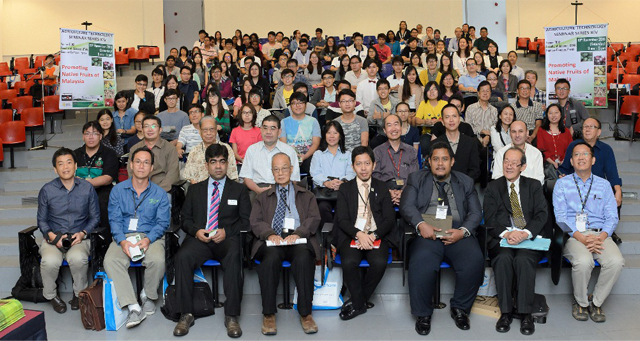
Group photo of the speakers and participants
The 14th series of the Agriculture Technology Seminar was held at the Faculty of Science (FSc), UTAR Kampar Campus on 19 November 2016 after the previous seminar in May this year.
Organised by UTAR Centre for Biodiversity Research (CBR), the seminar, themed “Promoting Native Fruits of Malaysia”, proved to be an enlightening affair featuring six speakers, namely Prof Dr Asgar Ali Warsi from University of Nottingham Malaysia’s, Casey Ng Keat Chun from UTAR, Dr Mohd Shukri Mat Ali @ Ibrahim and Mohd Norfaizal Ghazalli from Malaysian Agricultural Research and Development Institute’s (MARDI), Academician Prof Emeritus Dr Yong Hoi Sen from University of Malaya (UM), and Eric Chong San Dee from Green Acres Sustainable Farm, Penang.
In his welcoming address, Chairperson for UTAR CBR Dr Wong Wey Lim expressed his delight over the success of the seminar. “I hope that through this seminar, we can put our minds together to discuss how to improve our understanding about local fruits, how to increase production and improve farming, how to use technology more efficiently and so on,” he mentioned.
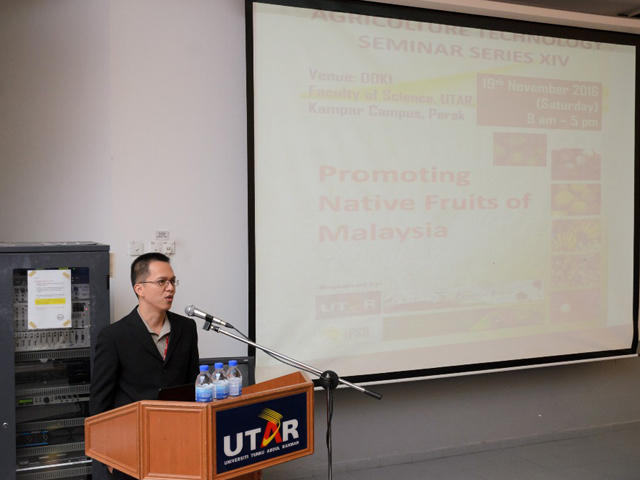
Dr Wong expressing his delight over the seminar’s success
Thanking the speakers on behalf of the organising committee, Organising Chairperson Prof Dr Peter Ooi Aun Chuan subsequently welcomed and introduced the six erudite speakers present to share their insights and knowledge. “Many fruits are seasonal. And as someone who enjoys eating fruits, it’ll be intriguing to see how we can explore harvesting those fruits even during the off-season,” Prof Ooi remarked.
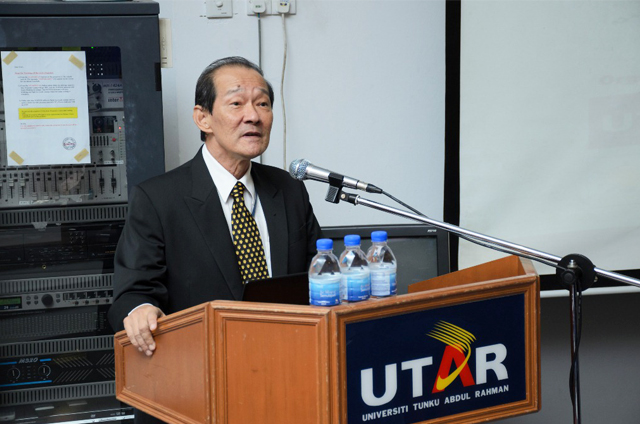
Prof Ooi thanking those who have supported sustainable agriculture
Also present were Dean of FSc, Assoc Prof Dr Lim Tuck Meng, FSc Deputy Dean for Academic Development and Undergraduate Programmes, Assoc Prof Dr Gideon Khoo, and FSc Deputy Dean for R&D and Postgraduate Programmes, Assoc Prof Dr Tee Chong Siang.
Starting the first presentation was Prof Asgar with his talk titled “Developing Edible Solutions for Postharvest Problems of Malaysian Fruit and Vegetables”. The Director of the University of Nottingham’s Centre of Excellence for Postharvest Biotechnology (CEPB) explained that many important tropical fruits such as bananas, mangoes, papayas, avocados and guavas are climacteric, and thus ripen rapidly during transition and storage processes. “There are chances for these fruits to slow down ripening after harvest and have extended shelf lives through controlled atmosphere storage, modified atmosphere packaging, or with edible coatings,” said Prof Asgar, who further shared with the audience the potential effects of several natural based edible coatings such as chitosan and gum arabic on delaying the ripening, prolonging postharvest life, and reducing decay of horticultural commodities during storage.
Ng, who is the UTAR Agricultural Science Journal’s Working Committee Member, highlighted the current threats to the country’s banana biodiversity in recent years in “Banana: An Old Favourite with a New Problem”. According to him, in recent years, local night markets or fresh markets have no more than five cultivars sold despite the initial record in 1919 stating 34 cultivated varieties of bananas being planted in the country. “The standardization by the European Union for the quality of bananas is an example of limiting the variety of bananas being marketed, thus reducing the companies to only plant one or two species,” added Ng, who is also a PhD candidate at UTAR FSc.
In Dr Mohd Shukri’s presentation titled “Conservation and Utilization of Mangifera Species in Malaysia”, the audience was given a glimpse of the different species found in the country as well as further utilization of other potential mango species for value-added products, such as juices, pickles or dehydrated candies which also boost the farmers’ income. “In terms of conservation, MARDI has carried out ex situ conservation of Mangifera species with 18 Mangifera species currently conserved in the Serdang, Selangor and Jelebu, Negeri Sembilan. The Department of Agriculture, Peninsular Malaysia, Sabah and Sarawak also maintained similar conservation of the Mangifera species. Even farmers throughout Malaysia also contribute to the on-farm conservation of the species,” the Principal Researcher and Deputy Director of the Program on Conservation and Management of Genetic Resources and Germplasms, Genebank and Seed Centre, MARDI added.
Prof Yong’s “Insect Pests of Fruits” effectively highlighted the diversity and problems of fruit flies which have economical importance. According to the Emeritus Professor in Genetics and Zoology at UM’s Institute of Biological Sciences, human activities such as monocultural farming practices, use of different and large quantity of pesticides and so on. “Fruit flies of the family Tephritidae, represented by approximately 4000 species in 500 genera, are among the most serious insect pests of fruits. About 35% of species attack soft fruits which include commercial fruits. Likewise, the fruit flies of the subfamily Dacinae are also potentially harmful to commercial fruits as well as vegetables and flower crops,” said Prof Yong, and added that these species are widely distributed throughout tropical Asia, the south Pacific and Australia with 73 species being documented as economically important in the Pacific Region.
“Conversation and Utilization of Nephelium L.” was the following topic presented by Norfaizal, who is a Senior Researcher in the programme of Genetic Resources and Germplasm Conservation Management, Genebank and Seed Centre, MARDI. Norfaizal elucidated the fact that the commonly seen rambutan (Nephelium lappaceum) is the only commercial species widely cultivated throughout Southeast Asia and that the Nephelium species are currently still underutilized with most growing in the wild or semi-wild conditions and producing edible but lesser quality fruits. He also elaborated on MARDI’s various conservation initiatives as well as Nephelium’s potential for consumption and usage. “Breeding work for wild and underutilized Nephelium is crucial to revive and maintain the competitiveness of Malaysia’s Nephelium genetic resources because the wild species comes with great variation and characteristics in terms of tree endurance.”
Owner of Penang’s Green Acres Sustainable Farm, Eric Chong San Dee shared his experiences as a small-scale organic farmer and encouraged the audience to explore farming through his presentation titled “The Green Acres Farm – Is Small Scale Organic Farming Sustainable?”. “Not many people are aware that farmers affect the air and water quality too,” Chong said, and shared how organic farmers ensure long term sustainability of the environment in the way they safeguard biodiversity, grow and market their produce. The presentation also shed light on how small scale farmers sustain themselves via collaborations with the local network, like-minded industries, and international organisations; as well as through agri-tourism and farm-homestay.
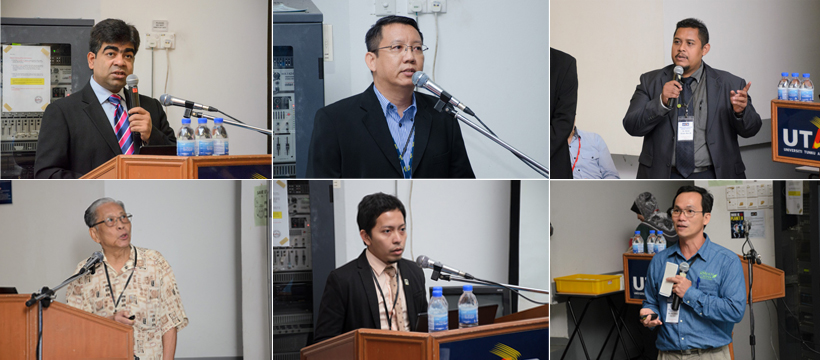
Clockwise from most left: Prof Asgar, Ng, Dr Shukri, Chong, Norfaizal, and Prof Yong
The one-day seminar concluded with a summary by Prof Ooi, followed by a closing remark by Dr Lim. “To our students, I hope the seminar will give you good exposure where you will understand the problems faced by the farmers as well as the world at large,” said Dr Lim, who also wished for more enriching seminars to come.
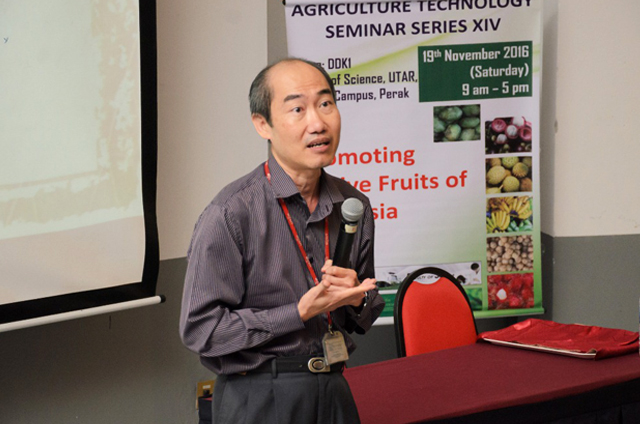
Dr Lim thanking the organising committee
Over 120 participants comprising students, academics and the public attended the seminar which was also sponsored by Kuala Lumpur Kepong Bhd and Chemopharm Sdn Bhd.
Wholly owned by UTAR Education Foundation Co. No. 578227-M LEGAL STATEMENT TERM OF USAGE PRIVACY NOTICE